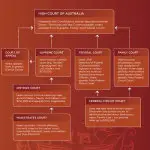
The advantages of court hierarchies are as follows:
The doctrine of precedent. The doctrine of precedent is reliant on the existence of a court hierarchy. The judgements of superior courts are binding on lower courts, so without a clear hierarchy, this system would be unworkable. Binding precedents allow for the law to be decided and applied with consistency and fairness to all.
Appeals. Court hierarchies allow for the hearing of appeals. If a defendant, plaintiff or prosecutor is dissatisfied with the outcome of a trial, he or she has the automatic right of appeal to a higher court. This provides appeals with a clear direction – the appeal remains within the court hierarchy, everyone concerned knows where appeals will be considered, while appellate courts become used to hearing appeals of a particular type. Without a court hierarchy, these reviews would have to be conducted in specialist appeals courts, which may invite its own problems.
Locality. In every jurisdiction, there are more inferior courts (Magistrate’s and Local Courts) spread across a wider area. In Victoria, for instance, there is a Magistrate’s Court in the Melbourne CBD, a dozen more in suburban Melbourne and close to 40 in regional and rural towns. This allows the courts to deal with relatively minor matters, without defendant, plaintiff, witnesses and legal representatives having to travel extensively. Many also consider it appropriate that minor criminal matters, which are often crimes against property or public order, be dealt with in the community where they occurred.
Specialisation. Since a court’s position in the hierarchy determines the type of cases it will deal with, courts can develop experience in dealing with these cases. Courts, magistrates and judges become well versed in dealing with certain types of criminal cases or civil disputes. As a result, they become familiar with the legislation, precedents, legal principles and court procedures that apply to these cases. That means there is often less need for research or consideration, which ‘speeds up’ trials and hearings, saving time and money. Hierarchies also allow for diversification and creation of specialist courts for dealing with children, family law, drug offences and Koori offenders.
Expertise. Intermediate and superior courts, and particularly the judges who oversee them, are usually better equipped to handle cases involving greater factual and legal complexity. Only judges with considerable experience and expertise as lawyers – and sometimes as magistrates/judges in inferior courts – are appointed to the bench of the Supreme Court. They are therefore better placed to understand cases involving serious charges, such as murder, or complex points of law.
As with most aspects of the legal system, court hierarchies might also entail some disadvantages. The obvious problem is that hierarchies in the State and Federal jurisdictions can be complex – they are probably not well understood by the average person. The hierarchy’s reliance on the doctrine of precedent may be too restrictive: a ‘bad precedent’ in a higher court may affect many cases further down the hierarchy before it is amended. The appeals process can also be used frivolously or without good cause, which can clog up higher courts with pointless reviews.
© lawgovpol.com 2014. Content on this page may not be republished or distributed without permission. For more information please refer to our Terms of Use.

